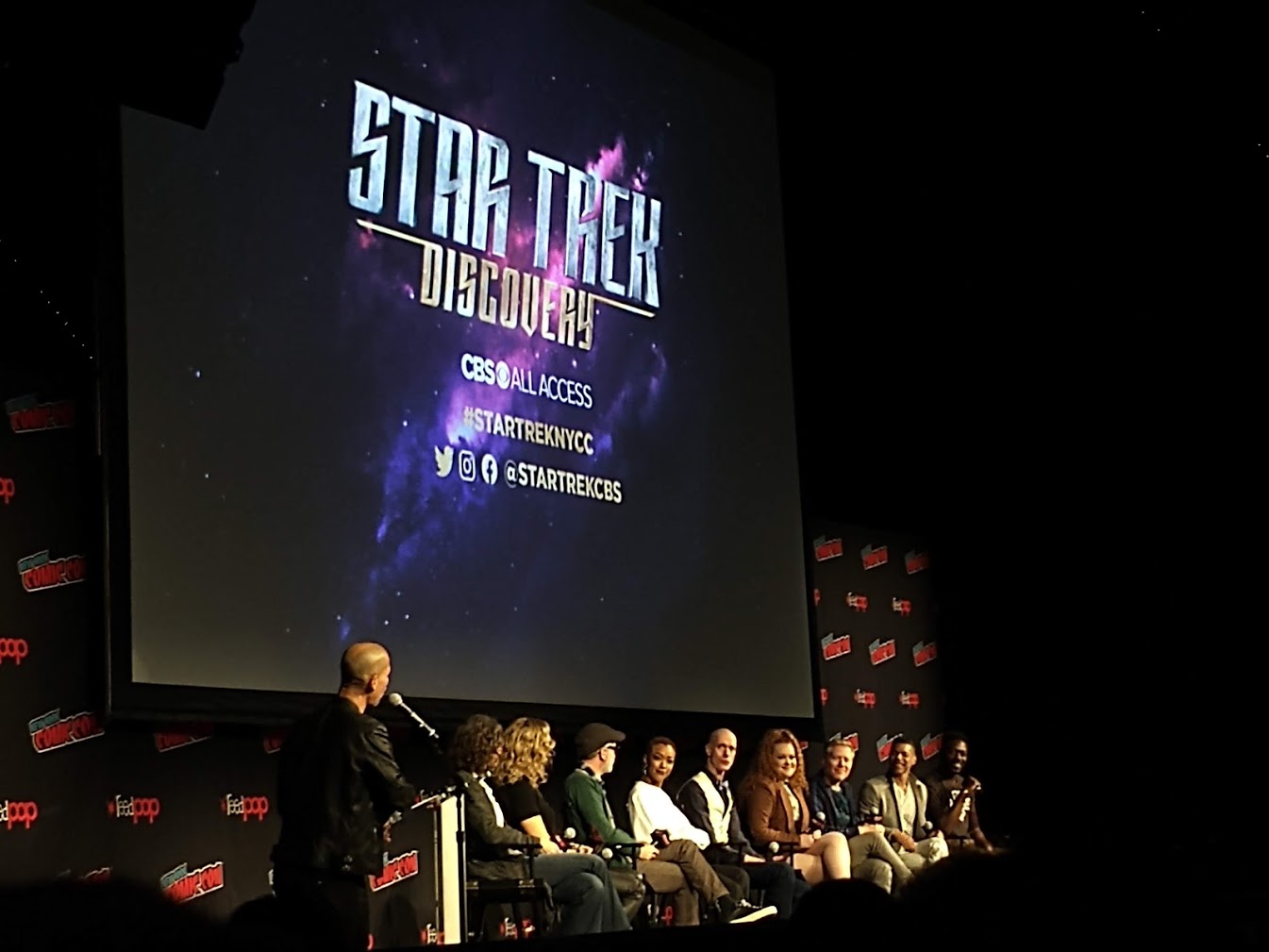Star Trek: Discovery Jumps 930 Years Into the Future
The Federation is in tatters

NEW YORK — While fans and critics have generally been pretty positive about Star Trek: Discovery, there is one recurring (and valid) complaint: The show is just filling in the gaps in existing canon rather than exploring a time period that Trek fans have never seen before. That will no longer be an issue in Discovery Season 3, as the ship has jumped 930 years into the future — the farthest ahead the franchise has ever ventured.
I attended the Star Trek Universe panel at New York City Comic Con on Oct. 5 to learn all the details firsthand. There, the show’s main cast and crew discussed the general plan for Season 3, and whether the U.S.S. Discovery will ever make it home again. (Spoiler alert: Probably not.)
“We are married to canon”
The first season of Discovery covered a war between the Federation and the Klingons, which took place nine years before Captain Kirk set of in the U.S.S. Enterprise for the first time. It was a story that Star Trek fans hadn’t heard before, but the setting still ultimately constrained what the show’s creators could do with the material. No matter what the Discovery accomplished, it would have to fit into the existing Star Trek narrative.
“Canon is wildly important to us,” said Alex Kurtzman, the show’s executive producer. While Discovery tweaked some aesthetic designs here and there, the team took care to ensure that nothing in the story would require major adjustments to the existing timeline. (As a longtime Trek fan, I can confirm that Discovery squares pretty neatly with everything that came before it.)
“We are married to canon,” agreed Michelle Paradise, one of the show’s writers. As such, she explained, Discovery comes with two sets of challenges: crafting stories that capture an audience’s attention while still delivering the “feel” of Star Trek that longtime fans have come to enjoy.
At the end of Season 2, the U.S.S. Discovery propelled itself 930 years into the future to destroy a rogue AI called “Control” that could have engulfed the whole Federation. A Season 3 trailer, which debuted at the panel, gave fans a few hints about what to expect. In the 32nd century, the Federation seems to be in rough shape, and those who still believe in its ideals seem eager to conscript Discovery into the fight against lawlessness.
There seem to be two major benefits to the Discovery’s trip through time. First: It gives Star Trek fans a time period they’ve never seen before, replete with opportunities to wrap up a number of lingering mysteries about “What happens next?” from The Next Generation, Deep Space Nine and Voyager. Second, it gives the show’s creative team much, much more freedom with the story. All six of the previous Star Trek series are centuries in the past; the future is unwritten, and there is no predestined point for the story to reach.
Sign up to get the BEST of Tom's Guide direct to your inbox.
Get instant access to breaking news, the hottest reviews, great deals and helpful tips.
Character development
Of course, expanding the Star Trek story is only part of why fans tune into Discovery; another reason is because of the magnetic cast of characters. Each actor had a chance to expound on where their character arc might take them in Season 3.
For Sonequa Martin-Green (Cmdr. Michael Burnham, the show’s protagonist), her character’s arc is all about hope.
“We aren’t who we are ultimately going to be,” she said. She lauded the show’s “courage, respect [and] gentleness” in handling character arcs, and explained how Burnham will finally find the right balance between her Vulcan upbringing and her human DNA.
As for her co-commander, Mr. Saru (Doug Jones), he spoke a little bit about living without fear. In the show, he belongs to a race called the Kelpiens, who are timid and passive by nature. But a physiological change in Season 2 made him much bolder and more prone to taking risks.
“What was I afraid of all this time?” he asked. “Whatever we fear may not be real.” He said the lesson could apply particularly to fans who suffer from depression or anxiety, and realize after the fact that the obstacles they faced were not as insurmountable as they seemed at the time.
However, neither Martin-Green nor Jones commented on which one of their characters became Discovery’s captain in the last few minutes of Season 2. (We’ll find that out early on in Season 3, apparently.)
Meanwhile, Paul Stamets (Anthony Rapp) and Hugh Culber (Wilson Cruz) will continue to mend their fractured relationship, and Sylvia Tilly (Mary Wiseman) will continue to punch above her weight class in order to prove how valuable she can be to Starfleet.
The dark side of Star Trek
One of the important aspects of Star Trek, Kurtzman said, was its ability to hold up a mirror to the society around it. And, at present, our society isn’t necessarily a pretty place. He said that Discovery Season 3 will deal with some “ugly truths” about fighting for the Federation. And since the Federation seems to be in tatters, it seems logical to assume that some of the Federation’s founding principles — freedom, tolerance, self-determination — might be called into question.
But Cruz reminded us that Star Trek is also always about holding humanity to a higher standard. “We know what’s right; we know what’s wrong,” he said. “We just have to stand up for it.”
Star Trek: Discovery Season 3 will debut in 2020 — probably well after January 23, since that’s when Star Trek: Picard is coming out.
Marshall Honorof is a senior editor for Tom's Guide, overseeing the site's coverage of gaming hardware and software. He comes from a science writing background, having studied paleomammalogy, biological anthropology, and the history of science and technology. After hours, you can find him practicing taekwondo or doing deep dives on classic sci-fi.

